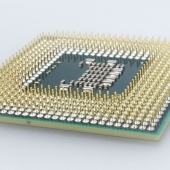-
Secret Chips Can Be Hidden in Replacement Parts to Spy and Take Over Smartphones
At a recently concluded security conference, experts from an Israeli university have presented new research that describes a possible attack scenario which leverages replacement parts to carry out attacks on smartphones and other smart devices.
- August 18, 2017
- 02:08 PM
 1
1
-
Computers, Smartphones Can Be Used as a Sonar-Like Tracking System
New research published this week by researchers from the University of Washington shows how an attacker could track a user's movements using speakers and microphones that come with computers, laptops, tablets, smartphones, and other devices.
- August 17, 2017
- 06:17 PM
 1
1
-
Botched Firmware Update Bricks Hundreds of Smart Door Locks
On Tuesday, August 8, smart locks manufacturer LockState botched an over-the-air firmware update for its WiFi enabled smart locks, causing the devices to lose connectivity to the vendor's servers and the ability to open doors for its users.
- August 12, 2017
- 09:00 AM
 2
2
-
USB Devices Vulnerable to Crosstalk Data Leaks
Just like water leaks from pipes, so do electric signals from USB ports, indirectly exposing sensitive data to a knowledgeable attacker, according to new research from scientists at the University of Adelaide in Australia.
- August 12, 2017
- 12:25 AM
 0
0
-
Locky Ransomware Returns with Spam Campaign Pushing Diablo6 Variant
A large malspam campaign is underway that is pushing a new Locky variant that appends the .diablo6 extension to encrypted files. Is this the return of Locky or just a brief resurgence?
- August 09, 2017
- 04:30 PM
 2
2
-
New Intel CPU Cache Architecture Boosts Protection Against Side-Channel Attacks
Intel released a new CPU model this week, the Intel Core i9 7900X, which is the latest model to feature a new cache architecture that hardware experts believe it will make exploitation of side-channel attacks a lot harder.
- July 23, 2017
- 09:10 AM
 0
0
-
Security Flaws Are Everywhere. Even in Segway Hoverboards
Ninebot, the company behind Segway hoverboards, has issued new firmware to fix various security flaws that allow an attacker to connect to and take over users' devices.
- July 20, 2017
- 12:35 AM
 0
0
-
Coding Library Vulnerability May Trickle Down to Thousands of IoT Devices
A vulnerability codenamed Devil's Ivy is putting thousands of Internet-connected devices at risk of hacking.
- July 18, 2017
- 01:15 PM
 0
0
-
Home Security System Fails at Being Secure, Opens Homes to Hacking & Burglaries
The maker of a smart home security system has failed to patch five security issues in the firmware of his product. These flaws allow an attacker to bypass authentication, take over devices, and disable alarm systems, leaving homes exposed to burglaries.
- July 18, 2017
- 09:40 AM
 3
3
-
Experts Recover AES256 Encryption Key From a PC's Electromagnetic Emissions
A team of researchers from Fox-IT and Riscure has put together a device using off-the-shelve electronic parts that deduces encryption keys using only electromagnetic emissions coming from a nearby computer.
- July 16, 2017
- 08:45 AM
 1
1
-
Researchers Find a Way to Crack Satellite Phone Communications in Real-Time
Two Chinese scientists have come up with a method of decrypting satellite phone communications, which works almost instantly and provides a third-party access to secure conversations in real-time.
- July 10, 2017
- 12:30 AM
 0
0
-
EU Prepares "Right to Repair" Legislation to Fight Short Product Lifespans
To combat electronic waste and abusive practices like manufacturers legally preventing users from repairing their devices, the EU is preparing legislation that would legalize a customer's "right to repair," and would force vendors to design products for longer life and easier maintenance.
- July 08, 2017
- 06:32 PM
 10
10
-
OpenBSD Will Get Unique Kernels on Each Reboot. Do You Hear That Linux, Windows?
A new feature added in test snapshots for OpenBSD releases will create a unique kernel every time an OpenBSD user reboots or upgrades his computer.
- July 05, 2017
- 06:22 PM
 4
4
-
There Are Only 25 Devices That Respect Your Privacy
Last week, the Free Software Foundation (FSF) awarded new certifications in the Respects Your Freedom (RYF) program that highlights hardware vendors and devices that respect user privacy and allow the user full control over his device.
- July 03, 2017
- 04:50 AM
 1
1
-
No Windows Fix Just yet for the Intel Bug That Crashes CPUs
Some Intel CPU models are affected by a bug that crashes computers when a certain sequence of operations are being processed.
- June 27, 2017
- 02:50 AM
 1
1
-
Boatload of Security Flaws Make Fosscam IP Cameras Absolutely Useless
IP cameras manufactured by Chinese vendor Fosscam are riddled with security flaws that allow an attacker to take over the device and penetrate your network.
- June 08, 2017
- 06:35 AM
 0
0
-
Malware Uses Obscure Intel CPU Feature to Steal Data and Avoid Firewalls
Microsoft's security team has come across a malware family that uses Intel's Active Management Technology (AMT) Serial-over-LAN (SOL) interface as a file transfer tool.
- June 08, 2017
- 05:20 AM
 3
3
-
Some Old WiMAX Routers Contain OEM Backdoors
Some older routers built on the WiMAX technology contain backdoor accounts that appear to have been introduced somewhere along the devices' supply chain.
- June 07, 2017
- 12:30 PM
 0
0
-
Malware Uses Router LEDs to Steal Data From Secure Networks
Specially-designed malware installed on a router or a switch can take control over the device's LEDs and use them to transmit data in a binary format to a nearby attacker, who can capture it using simple video recording equipment.
- June 06, 2017
- 10:10 AM
 0
0
-
Motorcycle Gang Busted for Hacking and Stealing Over 150 Jeep Wranglers
The FBI has arrested members of a motorcycle gang accused to have hacked and stolen over 150 Jeep Wranglers from Southern California, which they later crossed the border into Mexico to have stripped down for parts.
- May 31, 2017
- 06:30 AM
 0
0
 1
1























